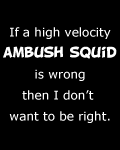Hullo fellow Skippy’s List readers.
I’m a regular reader of Slashdot. I saw particular comment that I felt I had to reply to in one of their stories, and once I started getting past the 1,000 word mark I thought perhaps I’m taking what is probably a troll far too seriously. The comment in question, for those of you who are curious:
As a professional photographer, I find the “semi-professional” title offensive. It’s like all the “engineering technicians” who claim to be engineers, college “professors” that don’t have their PhDs, and garbagemen claiming to be “sanitation engineers”. Actually, it’s worse. It’s like the kids who have changed a battery in their iphone and now claim to be computer repair specialists.
Honestly. I *hate* how society has come to a point where everyone believes themselves to be super-special.
I know how it goes. Don’t feed the troll. Ignore him, let it slide. The troll feeds off of your hate and anger, much like the Dark Side of the Force or the Youtube comments system. However, just as a video of skateboarding mishaps can teach a valuable lesson (always wear a cup!), I believe this (possibly willful) ignorance holds a potential lesson for all to learn. A lesson about language, how it changes, and how it can really, really piss off people who take the written and spoken word too seriously. This is the world we live in.
(Yes, I just ended a sentence with a preposition. Suck on that, grammar nazis!)
Let’s take this to the words themselves. I’m not going to jump into something about past participles or verb tenses or anything like that; I’m going to keep it real simple.
Professional/Semi-Professional
Example: A professional plumber. You can have good pro plumbers and bad pro plumbers. Plumbing is their profession, a job that is typically based on training they’ve had. The word has been diluted a fair bit over the years. First, anyone who did something for their livelihood – even if they weren’t trained for it – was considered a professional. Professional valet, professional short order cook, professional car washer. From that point, the word professional also divided into a term of being “elite”, i.e. “Man, that guy’s a pro[fessional] at Starcraft!”.
“Semi-professional” or “Semi-pro” can apply in multiple contexts here. It can apply to the training context, i.e. a semi-pro plumber – someone who hasn’t yet completed their vocational training. It can apply to the livelihood context, i.e. the case of the photographer who happens to be mentioned in the example comment. He surely doesn’t depend solely on his photography on his livelihood, and therefore in this context he would be Semi-professional. Lastly, there is the skill-based usage of the word, such as “Semi-pro” boxer. Semi-pro is simply a nicer way of saying “amateur”, because the word “amateur” itself (when used in a competitive or business context) has been diluted to a meaning of “talentless” and/or “incompetent”.
Engineering Technician
I had to look this one up, because I honestly had no idea what an Engineering Technician is. According to the Wikipedia article, “An engineering technician is a specialist who is trained in the skills and techniques related to a specific branch of engineering, with relatively practical understanding of the general engineering concepts.”
Going back to the word here, “engineering” refers to a discipline and “technician” is a person who works with technology (see how the “tech-” words are all similar-like?). Simply put, an Engineering Technician is “one who works with technology related to engineering”.
Professor
Professor means “one who professes”, i.e. the guy who gets up in front of a class and tells people stuff. You in no way need to have a PhD to be a professor. Are you honestly going to say that the guy who worked in a shop machining parts and building his own tool dyes (i.e. the parts of a machine that is used to build parts for other machines) for 30 years wouldn’t be qualified how to teach someone how to do the same job?
In this case, Professor is just a term typically applied to someone who teachers as a college/university level. There’s loads of professors who don’t have a Doctorate at all; some simply have Masters Degrees or a simpler Bachelor’s Degree with a couple decades of practical experience in the field. Professor as a term nowadays is simply a rank.
Sanitation Engineer
The term “Sanitation Engineer” actually applies to a specific discipline. A cursory Google search revealed this Wikipedia page, which explains that a Sanitation Engineer is one who applies engineering principles to improve sanitation. An example off the top of my head would be someone who designs a more efficient, environmentally-friendly way to process waste products at a sewage plant.
This aside, I’m quite sure the (probably troll) poster was referring to waste collectors (i.e. garbagemen) who refer to themselves in such a manner, just like janitors are “custodial engineers” and cafeteria ladies are “Culinary Technicians” (or something similar). I refer you to a movie called “Peaceful Warrior”, that stars Nick Nolte (of all people) in a wise, mentor-type role:
Dan: Hey Socrates [Nolte’s character], you know so much… how come you’re working at a gas station?
Socrates: This is a Service station. We offer service. There’s no higher purpose.
Dan: Than pumping gas?
Socrates: Service to others.
Granted this is a dramatization, and I’m sure there’s scores of people who work mundane, low-wage jobs who absolutely loathe them. But then again, there’s the man who’s a greeter at Wal-Mart or the woman who is a front-desk clerk at a little motel out in the countryside and they love their jobs. They have pride, and they really do believe that they are serving others in this respect.
So, the terms like “Custodial Engineer” are really a matter of pride about one’s work. Someone who calls themselves a Custodial Engineer isn’t someone who feels particularly bad about being a janitor; it’s someone who has pride in their work. It’s mind-boggling how anyone could find a job where you work hard and get your hands dirty as something to be looked down upon.
Ironically, I understand.
I see people use the word “Ironic” in situations that are not ironic. (See: “Ironic” by Alanis Morissette.) The term “Ironic” as it’s most often applied today is a new definition of the term – Situational Irony. Situational Irony is the classic scenario where a cartoon character would put a huge box of explosives next to something, run a wire back to a plunger, pull the plunger and have the plunger explode instead of the explosives.
I understand the point of view of the comment poster because I was once like him. I would see a news story say that the local baseball team was “decimated” and positively steam at the misuse of the word. (Decimation: removal of a tenth, a punishment in which soldiers of a Roman army unit drew lots and 1/10th of them were killed). Admittedly, seeing 10% of the Yankees executed by beanballs – firing-squad style – at the 7th inning stretch might pack the stadiums again and lower the overall team’s expenses. I’d bet the organ player would love to play a nice funeral dirge every once in a while. Drummer boys would be back in business! Even so, I’m pretty sure that the Sports Guy on W-TMF Channel 12 didn’t intend to insinuate that a tenth of the team was brutally murdered in order to teach the other 90% a lesson (although that would be pretty awesome). The constant misuse of “decimation” has added a whole new definition to the point where it superceded the original.
Five years ago, I would have mostly agreed with the comment poster. Now? Not so much. I now know that every language is a living language that changes almost on a daily basis. Yes, I die a little inside when I see “LOL”, “OMG”, and other such words added to one of the most prestigious English-language dictionaries in the world. I am loathe to admit that those are words in common vernacular now.
So yeah, when someone misuses a word based on its proper definitions, correct them if you feel like it. Go easy on the anger and Light Ranch Dressing on the sarcasm – just enough bitterness with a hint of chives. However, keep in mind that if enough people keep misusing words and grammar for a few decades, that usage will be accepted as part of the living language. In this age of the Internet, that time will be shortened to a handful of years (or months!). People who are improperly use grammar and words enough times can eventually cause those uses to be integrated into the language.
Isn’t it ironic?
For those of you who are curious about what’s been going on with Pastor Danny Iverson’s little adventure in Iwaki, Japan, you can keep up with the latest about his mission at SpendYourself.org. There’s pictures, videos, and all other sorts of good stuff.



 Follow
Follow







